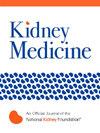Effect of a Population Health Management Intervention on Medication Therapy Problems in People With Chronic Kidney Disease: Post Hoc Analysis of the K-CHAMP Cluster-Randomized Trial
IF 3.2
Q1 UROLOGY & NEPHROLOGY
引用次数: 0
Abstract
Rationale & Objective
Medication therapy problems (MTPs) are therapeutic issues related to medications that may cause undesirable events. People with chronic kidney disease (CKD) are at high risk of experiencing MTPs owing to comorbid conditions and medication burden. This study characterizes MTPs in individuals enrolled in the Kidney Coordinated Health Management Partnership trial and evaluates the intervention’s effect on MTPs.
Study Design
Post hoc analysis of a pragmatic, cluster-randomized trial.
Setting & Participants
Individuals aged 18-85 years with an estimated glomerular filtration rate of <60 mL/min/1.73 m2, moderate to high risk of CKD progression, and not seeing a nephrologist enrolled from 101 primary care practices (May 2019 to November 2021).
Intervention(s)
Electronic health record-based multidisciplinary care including nephrology e-consult, pharmacist medication review, and patient education at baseline and every 6 months.
Outcomes
MTP type and frequency of occurrence were characterized along with associated medication classes. Descriptive statistics of MTPs were conducted, and cumulative probabilities of resolution over time were estimated using the discrete-time survival method.
Results
Baseline medication reviews were completed by telephone (52%) or chart review (48%) in 730 out of 754 (97%) intervention-arm participants (mean age, 74 ± 9 years and estimated glomerular filtration rate, 37 ± 8 mL/min/1.73 m2). Polypharmacy was evident in 63% of participants. At baseline, 78% had MTPs and 79% had medication discrepancies. The most common MTP was indication without drug therapy, associated with sodium-glucose cotransporter-2 (SGLT-2) inhibitors. The average number of MTPs per participant decreased from 2.01 at baseline to 1.28 at 6 months (36% reduction), and 1.15 at 12 months (43% reduction). Based on the discrete-time survival model, an estimated 92% of MTPs were resolved by 12 months.
Limitations
Medication management was not completed for control-arm participants. No standardized tool was used to assess medication adherence. We relied on electronic health record chart review to identify MTPs in participants who could not be reached by telephone.
Conclusions
MTPs and medication discrepancies are highly prevalent in nondialysis-dependent CKD. Medication management through multidisciplinary team care can optimize medication therapy in CKD.
Plain-Language Summary
People with chronic kidney disease (CKD) are at risk of experiencing medication therapy problems (MTPs), which are issues related to medications that may cause undesirable events. In this study, we characterized the types of MTPs experienced by people with CKD in the primary care setting and evaluated the effect of a multidisciplinary intervention on MTPs. At baseline, 78% of participants had MTPs. The most common problem was not being prescribed a medication for a diagnosed condition. The average number of MTPs per participant decreased by 43% at 12 months. This study helped us to understand MTP characteristics in people with CKD and shows that multidisciplinary team care can optimize medications.
人口健康管理干预对慢性肾病患者药物治疗问题的影响:K-CHAMP群随机试验的事后分析
基本原理及目的药物治疗问题(MTPs)是与药物相关的治疗问题,可能引起不良事件。由于合并症和药物负担,慢性肾脏疾病(CKD)患者经历MTPs的风险很高。本研究对参加肾脏协调健康管理伙伴关系试验的个体的MTPs进行了特征分析,并评估了干预对MTPs的影响。研究设计:一项实用的集群随机试验的事后分析。设置,参与者年龄在18-85岁,肾小球滤过率估计为60 mL/min/1.73 m2, CKD进展的中至高风险,未见肾脏病专家,来自101个初级保健诊所(2019年5月至2021年11月)。干预措施:基于电子健康记录的多学科护理,包括肾脏病电子咨询,药剂师药物审查,基线和每6个月对患者进行教育。结果mtp的类型和发生频率与相关的药物种类有关。对mtp进行描述性统计,并使用离散时间生存法估计随时间的累积解决概率。结果在754名(97%)干预组参与者中,有730名(平均年龄74±9岁,肾小球滤过率为37±8 mL/min/1.73 m2)通过电话(52%)或图表(48%)完成了基线药物评价。63%的参与者明显存在多药现象。在基线时,78%有MTPs, 79%有药物差异。最常见的MTP是无药物治疗的适应症,与钠-葡萄糖共转运蛋白-2 (SGLT-2)抑制剂有关。每位参与者的平均MTPs数从基线时的2.01个下降到6个月时的1.28个(减少36%),12个月时的1.15个(减少43%)。根据离散时间生存模型,估计92%的mtp在12个月内得到解决。限制:对照组的参与者没有完成药物管理。没有使用标准化的工具来评估药物依从性。我们依靠电子健康记录表审查来确定无法通过电话联系到的参与者的mtp。结论非透析依赖型CKD中smtps和用药差异非常普遍。通过多学科团队护理进行药物管理可以优化CKD的药物治疗。慢性肾脏疾病(CKD)患者有经历药物治疗问题(MTPs)的风险,这些问题与可能引起不良事件的药物有关。在这项研究中,我们描述了初级保健环境中CKD患者经历的MTPs类型,并评估了多学科干预对MTPs的影响。在基线时,78%的参与者有MTPs。最常见的问题是没有为诊断出的病症开处方。12个月后,每位参与者的平均MTPs数量下降了43%。这项研究帮助我们了解CKD患者的MTP特征,并表明多学科团队护理可以优化药物治疗。
本文章由计算机程序翻译,如有差异,请以英文原文为准。
求助全文
约1分钟内获得全文
求助全文

 求助内容:
求助内容: 应助结果提醒方式:
应助结果提醒方式:


